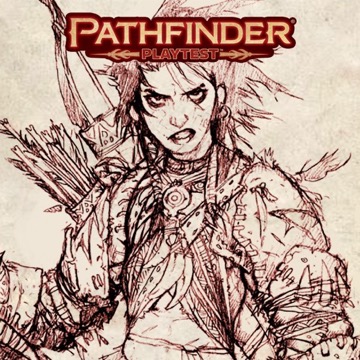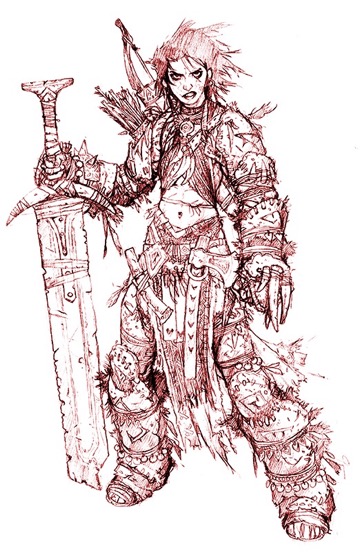Rage consumes you in battle. You delight in carving through your enemies using powerful weapons and wreaking havoc without needing complicated techniques or rigid training, and you rely on your astonishing durability to get you through a fight. You associate your rage with a traditional symbol of affinity known as a totem, which might take the form of an animal, a spirit, or even a part of yourself. To many barbarians, brute force is a hammer and every problem looks like a nail; to others, the dark emotions within them are something to hold back and release only when it matters most.
When it came to barbarians in the playtest, we wanted to take the most popular parts of the original barbarian and the unchained barbarian and brew them together with a few special ingredients to make the class even more flexible to fit even more roleplaying and mechanical concepts. Let's take a look!
Rage
Rage is a barbarian's key class feature. Barbarians aren't super-trained in fancy weapon techniques like most of the other martial classes. Instead, a barbarian can enter a rage that drastically increases her damage and grants her a significant booster shot of temporary Hit Points, in exchange for a –1 penalty to AC and the inability to use concentrate actions unless they specifically have the rage trait (note, this means that somatic-only spells are now possible in a rage!). Unlike in Pathfinder First Edition, rage in the playtest is not limited in rounds per day—let's be honest, in Pathfinder First Edition, our barbarians never ran out of rounds anyway once they had gained a few levels. A rage lasts 3 rounds, followed by a round of fatigue. While you're fatigued, you can't rage again, but once that round has passed, you can enter a new rage, with a shiny brand-new set of temporary Hit Points to go along with it. You can do this as often as you need during the day!
Totems
Without a doubt, the most popular element of barbarians in Pathfinder First Edition is the totem, introduced in the Pathfinder Roleplaying Game: Advanced Player Guide. These totems are a set of three thematically linked abilities the barbarian can choose, starting at 2nd level. In the playtest, you get a totem right away at 1st level. Your totem is a representation of how and why you rage and grants you an initial ability, access to more totem feats down the line, and, at 9th level, resistance equal to your Constitution modifier against a specific type of damage. Each totem also has its own anathema, most of which are relatively low impact and designed to create roleplaying hooks. For instance, the giant totem's anathema states that you cannot fail to accept a personal challenge of your strength, much like how Amiri accepted the challenging task her tribal fellows set her to slay a frost giant. Some though, are stricter—the superstition totem requires that you never willingly accept the benefits of spells, but grants you some truly astounding antimagic abilities in exchange.
Some of the totems, like animal totem, giant totem, and dragon totem, offer a few abilities that are flat-out magical. For instance, animal totem barbarians can adopt animal features and attacks and even transform into an animal (a great way to represent lycanthrope characters), whereas dragon totem barbarians gain a dragon breath attack can even grow wings. Even though totems are popular and roleplaying opportunities are fun, we recognize not everyone necessarily wants to commit to them, so we also offer the fury totem, which has no anathema or special requirements and focuses more on barbarian feats that aren't tied to any totem, which we'll look at in a bit. But first...
Additional Barbarian Features
Though I called out rage and totems specifically, the barbarian has some really neat abilities beyond those. For instance, at level 3, barbarians gain critical specialization effects when in a rage, even if they don't fulfill the usual proficiency rank requirement for the weapon—they use whatever weapon is most efficient to express their rage! One other thing they have that nobody else does: 12 Hit Points per level. Add that to the substantial temporary Hit Points that they can generate (possibly multiple times in a long fight) and the resistances from their totem that kick in at level 9, and barbarians have incredible staying power. Sure, they don't prevent as many hits as a paladin or a shield fighter might, but they can stand there taking hits long past the point where anyone else could stay standing. This is also a good point to mention one feature barbarians don't have in the playtest: alignment requirements. Barbarians can be whatever alignment they want; for instance, a lawful barbarian might act like one of the concepts I described earlier, controlling and holding back her emotions to channel and release her rage when it matters most.
As many of you have predicted, barbarians also have the best Fortitude proficiency, gaining the juggernaut class feature at level 7 (which grants master proficiency in Fortitude and the ability to count any successes you roll as critical successes instead) and improved juggernaut at 13th (which grants legendary proficiency and removes the chance of critically failing), but they also have a secondary Will focus, gaining indomitable will at 15th level to become masters in Will. Tireless rage comes in at level 17 to allow barbarians to ignore fatigue after ending a rage (though they still must wait the normal amount of time before entering a new rage). Barbarians are all about brutalizing opponents without worrying about carrying lots of different weapons and selecting the right one for the job with their monster knowledge, so it makes sense that they gain the ability to rip through a chunk of resistances automatically with level 19's devastating strikes ability. Possibly my favorite barbarian feature, though, is the level 11 ability mighty rage—whenever you enter a rage, it allows you to immediately use one of your rage-only actions for free. So many possibilities!
Barbarian Feats
In addition to the feats based on totems, there are a variety of other feats available, from the bread-and-butter, low-level Sudden Charge to the devastating Whirlwind Strike (attack everything in your reach), Brutal Critical (your critical hits deal an extra die of damage as well as persistent bleed damage), Vicious Evisceration (you maim the enemy, dealing extra damage, reducing its maximum HP by an amount equal to its level, and giving it a –1 penalty to Fortitude), Contagious Rage (one of your allies gets the benefits and –1 penalty to AC imposed by your rage, but can still concentrate), and Quaking Stomp (you stomp so hard that it creates an honest-to-goodness earthquake). But none caused a playtest GM to raise their eyebrows quite like the superstition totem's Spell Sunder, which really saved us when we faced walls of force, magical trap effects, and more.
To close off, some of you might have expected me to talk about the dragon totem barbarian Linda is playing in my playtest game, who has sometimes been the party's primary healer. She does that through abilities beyond the barbarian class, though certainly Moment of Clarity (which allows a barbarian to use an extra action to use a concentrate ability mid-rage). But if you're wondering why there was a time in my playtest when she was the only one with an area attack, that was because of her barbarian's dragon breath!
Mark Seifter
Designer


